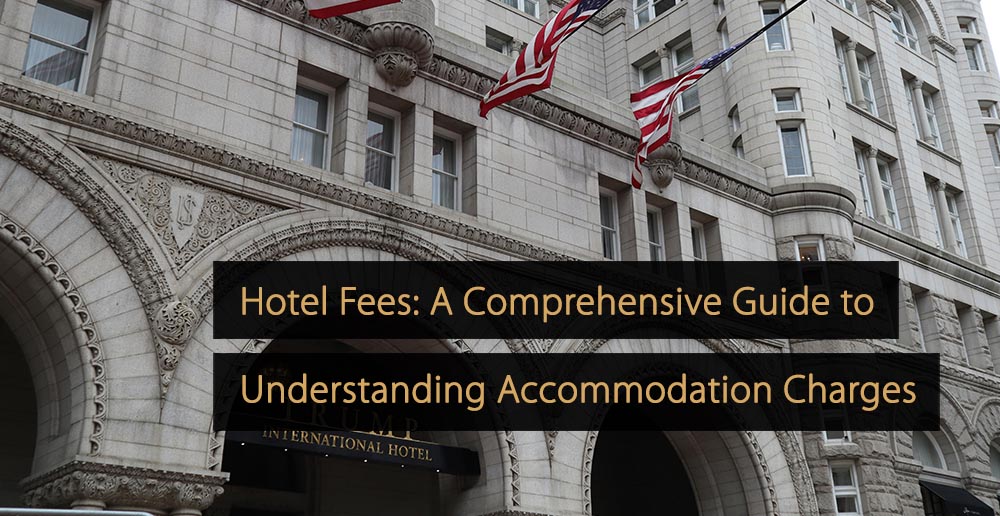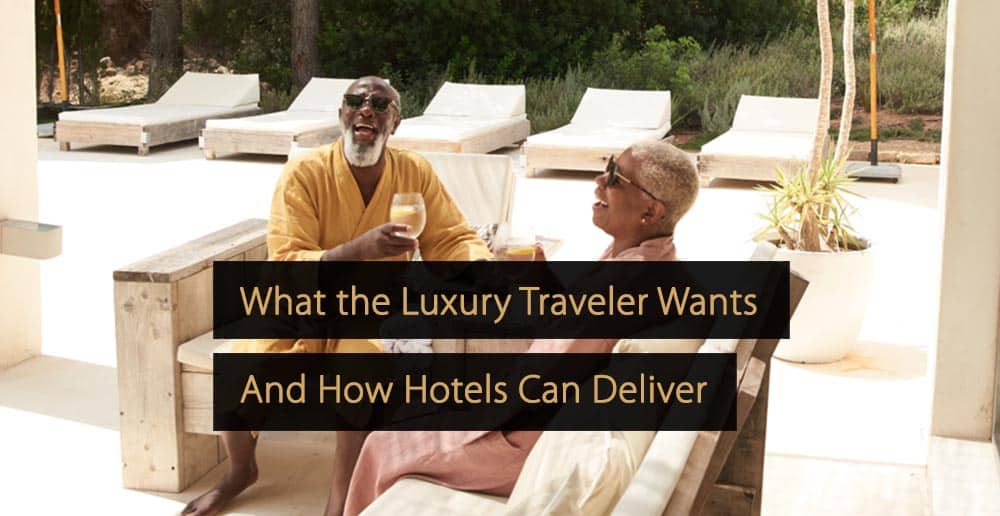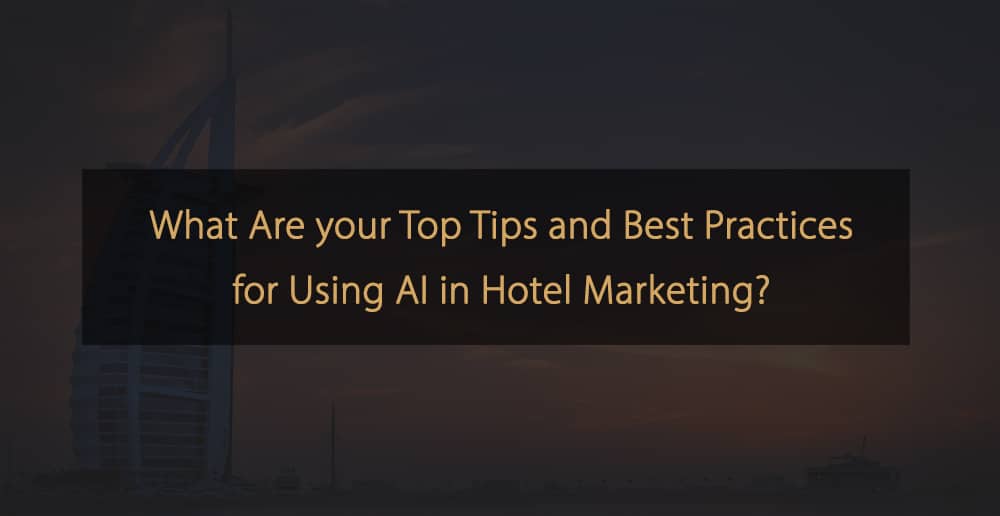Question for Our Hotel Marketing Expert Panel
How do guest expectations of the pre-stay digital experience differ between low budget and high-end properties? How do their tech expectations differ during their stay? (Question by Nicole Sideris.)
Industry Expert Panel
Our Industry Expert Panel exists out of professionals within the hospitality & travel Industry. They have comprehensive and detailed knowledge, experience in practice or management and are forward-thinking. They are answering questions about the state of the industry. They share their insights on topics like revenue management, marketing, operations, technology and discuss the latest trends.
Our Marketing Expert Panel
- Tamie Matthews – Revenue, Sales & Marketing Consultant, RevenYou
- Adele Gutman – Culture and Guest Experience Expert, Hospitality Reputation Marketing Podcast
- Max Starkov – Adjunct Professor Hospitality Technology, New York University
- Jacopo Focaroli – CEO & Founder, The Host
- Dustin Caromano – Director of Marketing and eCommerce, Première Advisory Group
- Nicole Sideris – Founder & Prinicipal Consultant, X Hospitality
- Luminita Mardale – Director Of Marketing And Business Development, Vienna House
- Grazia Dell’Aquila – Hospitality Consultant, IAMGRAZIA
- Thomas Dieben – Founder, Becurious
- Stephanie Smith – Founder, Cogwheel Marketing
- Ask Our Panel a Question
- Join Our Expert Panel
“Expectations of budget, boutique and luxury properties vary widely. When staying in the cheaper end of the market, guests are looking for a bed, shower and wifi. They want it to be clean and comfortable. Beyond that, it is a surprise and delight. Once customers start paying higher fees per night, they expect the tech will exceed that which they have in their own homes.
- Once upon a time, a hotel stay was an opportunity to enjoy facilities and amenities that we didn’t have in our own homes or everyday life. For some reason, hotels have stagnated and gone backwards. We need to get the 5-star end of the market back to being ahead of what we use every day.
- Once upon a time, a spa bath was the height of luxury and we stayed in hotels for 24 hours of indulgence, soaking in a very large tub which then became the norm for homes.
- Once upon a time Foxtel was a luxury most people couldn’t afford so we went to pubs to watch the game or got excited about having access to movies in a hotel.
- Once upon a time we paid for Wifi, then it became free and now it is a basic in Maslow’s Hierarchy of Needs.
5-star hotels need to be hitting it out of the park and exceeding expectations. The tech stack of a 5-star or boutique property must exceed the normal home.”
“As a traveller, I essentially expect the same for the most part. Sure, when I stay at a five-star property, I might expect a higher level of personalization and a more refined concierge-style approach. I also might expect more high-end imagery, perhaps even video. I don’t expect that from a 2-3 star hotel, but if I do get it, I really appreciate it. But I expect great service from any hotel I stay at. I always want to feel like a valued customer. Therefore, while the voice and the content might be different, the basics of what I expect from pre-stay communication remain the same.
I expect thoughtful communication that will help me make the most of my experience and also, help me avoid any problems or unwelcome surprises. So regardless of the level of the hotel here are some do’s and don’t to help you ensure your guests enjoy the experience they want and expect from your hotel and your brand.
- Don’t ask me to call to learn more about the details of the pet policy, the hours of the restaurant, the menu, pool hours, fitness options and schedule, or what I should expect regarding the credit procedures, fees, and anticipated maintenance during my stay. That should all be provided for me in advance via email and on the website and booking engine without my straining to look for it.
- Don’t skip the details or set me up for disappointment. If you tell me you have an evening reception, then don’t fail to tell me when it is and isn’t available. That’s not a guest expectation issue, it is the failure to communicate that is the true issue and it makes a guest feel disrespected, and that means they may never return.
- Do you want a customer for life? Do you want reviews, recommendations, and referrals? Do let your guests know what makes your hotel’s experience special and what unique local experiences are available during their stay. Do let guests know about any policies and procedures in advance so they are prepared and set up for success to have a great experience at your hotel.
Regardless of the level of opulence you provide, the level of heartfelt hospitality should always be 5-star.”
“I do not believe today there is a major difference in guest expectations between low-budget and high-end properties. Properties in both categories are dealing with increasingly digitally-savvy customers and are struggling with labour shortages plus rising labour costs, while being forced to do more with fewer employees.
ALL travellers demand contactless experiences at the property they are staying at, irrespective of its category. Any property can reduce its front desk staff by 50% or more by introducing mobile check-in and mobile keys, self-check-in kiosks, a chatbot on the website to handle service and information requests, an email reservation assistant app to handle email booking requests, an issue resolution technology applications and voice assistants in the rooms to handle customer service requests by stay-in guests. All of this for a fraction of the payroll expenses while greatly improving guest satisfaction.
The list goes on and on. Technologies that exist today can significantly reduce staffing needs and labour costs in all stages of service delivery, from pre-arrival customer engagements to on-property guest services and post-stay customer retention.”
“It depends on the type of guest and property. Expectations for the pre-and during-stay technology are likely to differ among different kinds of guests: the low-budget booking through an OTA might have a different expectation compared to 5-star regular guests. At the same time, common sense would suggest that a low-budget guest should be ready to “get what they paid for”. In the reservation process, you get the feeling if it’s a low-budget or a high-end property service. As a rule of thumb, the pre-stay in high-end properties requires a “guest preference form” (or even better, an “easy check-in online” feature) that usually follows/comes with the “reservation confirmation” email.
That’s of great help if we ask the right open questions- It makes us profile them in advance through relevant info, avoids potential complaints and issues, allows cross/up-selling, and highlights the local activities in the area during their stay. That proves that we are intuitive and attentive while creating a connection, and building our reputation. The silver lining is that technology is becoming more accessible and cost-effective, so even low-budget pre-stay and in-house services can be improved by chatbots and CRMs, to name a few.”
“I think there are high expectations among guests when using technology at a property, regardless of their scale or class. Unfortunately, other industries have rolled out and have been perfecting similar products for years, so the marketplace is already conditioned to be able to adopt them. Hotels in general are simply playing catch-up across all aspects of the buyer’s journey.
Service standards within the luxury segment is often white-glove, but that doesn’t mean that there is an opportunity to automate the process or enhance the experience through technology. It simply means white-glove service won’t be replaced as it’s still an expectation.”
“Guests want a new way to stay, travel and gain new experiences. The standard cookie-cutter big brands are not delivering. Today hotels must provide the ability to have two-way communication with guests before they arrive. In making hotels digital, I often see hostels in many cases communicate better with their guests than hotels. The ability to SMS guests before they arrive is essential. Today we are rolling out two-way messages in all pre-stay communication, informing guests about the hotel’s curated stay-list, facilities etc., as this is becoming the expectation. Hotels that have legacy systems in place need to review and evaluate the way they wish to operate and communicate with their guests.”
“There is probably no other industry that relies on customer satisfaction as much as the hospitality industry. Hotel technology now plays a pivotal role in enhancing the guest experience, increasing revenue and attracting, engaging and retaining guests and there is no difference between a low-budget or a high-end property.
- Mobile check-in and digital key: A study reported by eHotelier found that 85% of international travellers have some kind of mobile device while exploring the world, so it is no surprise that 70% of guests want to use their phone to speed up check-in.
- Ease of communication: Millennials and the new generations are communicating by texting and on digital channels. But we can’t forget we work in the hospitality industry and a large proportion of guests still want the human touch.”
“Low-budget and high-end properties provide a different experience for their guests based on service and especially the details. Since the guest experience begins way before a customer arrives at the hotel, if the hotel guarantees a distinctive digital experience, it will make a difference. However not all the hotels are able to provide it.
To create the feeling of a digital experience, the hotel does not need to have the latest technology tools but can provide a higher-end experience for guests without completely investing their budget. The solutions for low-budget properties are:
- guests request check-in through an app on their phones
- A chatbot or texting service with can take care of extra requests before arrival
The difference between low-budget and high-end is that the personalisation offered by high-end proprieties can lead from a seamless pre-arrival experience to a seamless in-house experience to a flawless post-stay experience because they offer important digital solutions such as augmented reality before arrival. With this, it is possible to see the hotel and visualize places and activities before the arrival and offer guests an immersive experience. High-end properties are more connected with the guests before they arrive through artificial intelligence.
This approach may be seen as cold but modern travellers actually tend to appreciate the technological tools as they bring convenience, customisation and personalisation.”
“Low-budget, high-tech concepts are becoming popular. With the high-tech approach, pre-stay information about the check-in procedure is necessary. Checking in online or via a booth on-premise becomes possible for all types of hotels. However, we see that hotels with a higher service level and their guests prefer the personal touch when checking in. Pre-arrival emails with upselling possibilities are becoming a standard in all levels of hotels.”
“Mobile key and good WiFi are expected, regardless of the type of property. These are as expected as a clean room and comfortable bed.”
Ask a Question & Join Our Expert Panel
Would you like a question to be answered by our Industry Expert Panel? Or would you like to join our community of experts and share your experience, insights, and knowledge with fellow industry professionals? Via the buttons below you can submit a question or submit a request to become part of our expert panel.
More Tips to Grow Your Business
Revfine.com is the leading knowledge platform for the hospitality and travel industry. Professionals use our insights, strategies, and actionable tips to get inspired, optimize revenue, innovate processes, and improve customer experience.Explore expert advice on management, marketing, revenue management, operations, software, and technology in our dedicated Hotel, Hospitality, and Travel & Tourism categories.

















Leave A Comment